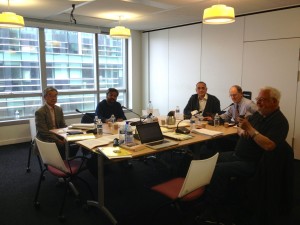 Vers une pensée vraiment universelle ? L’apport des auteurs non-occidentaux à la construction de la modernité
Vers une pensée vraiment universelle ? L’apport des auteurs non-occidentaux à la construction de la modernité
Jeudi 16 mai, 14h30, 3e session : L’universel et l’altérité
Yves Schemeil, professeur à l’IEP de Grenoble
Au lieu d’opposer les conceptions occidentales et non occidentales de la politique et de la société, sans parler de l’opposition classique mais dépassée de la modernité et de la tradition, cette communication montrera comment différents courants de pensée ont contribué toutes ensemble à l’édification d’une pensée moderne. Les traductions et les commentaires qui se multiplient rendent aujourd’hui possible un premier bilan des ces apports, venus du monde musulman, du monde arabe, du monde indien, du monde chinois et du monde japonais. Ils permettent d’infirmer l’idée que les valeurs dites universelles seraient en réalité purement occidentales, car elles ne sont pas nées uniquement en Europe mais proviennent aussi de sources non européennes.
Lundi 13 et mardi 14 mai
Workshop sur la pensée politique non occidentale. Une initiative du Collège d’Etudes Mondiales de la FMSH.
Conçu et animé par Yves Schemeil, il a réuni (de gauche à droite sur la photo) Hiroshi Watanabe (Tokyo), Rajeev Bhargava (Delhi), Tewfic Aclimandos (Le caire), Charles Butterworth (Maryland), et Jean Leca (Paris)
Non-Western Political Thought: Further Reflections on Modernity
Paris, Fall 2014
This project is part of a series of events of the College d’Etudes Mondiales, inaugurated in May 2013 by a workshop among scholars to retrieve the contribution of non-Western thinkers to Universal ideas about justice, liberty, and democracy. As a closed-door meeting due to be held in Paris, Fall 2014, with guest contributors nominated by the founding committee to achieve a more adequate representation of all regions, it will prepare a 2015 World Congress.
We want to break with the view that anything worth of intellectual value would already be enclosed into Western philosophy. The equivalence between “universal”, “modern”, and “Western” should not conceal non-Western contributions to a global intelligence of world history. Essential problems were often defined likewise everywhere, and the concepts coined to address them are very similar even though the solutions given varied. If we define modernity by the generalization of democracy, tolerance and rationalism, if not secularism and individualism, then modernity existed long before the West invented it, albeit in particular guises. That, prior to the Meiji restoration Japanese had no word for constitution and religion–also unknown by Hinduism–or Muslims substituted “friendship” and “mutual love” to “justice” does not mean that functional equivalents were unknown, or that concepts are required for a reality to exist.
One way to address translation difficulties is to discuss the significations of modernity, some born in the “modern” West, and others imagined in the “traditional” Rest. The visions of Middle Eastern, Indian, and Japanese experience with modernization that we may exhume from the texts contradict the famous Literature on the Axial Age–according to which the premises of modernity occurred virtually at the same time and entailed the same profound intellectual changes. In contrast, we assume that the notion of modernity emerged at different times and places. We must also abandon the idea that from the West to the East it is a one-way street, even though Western specificity may eventually lies in management capabilities and organizational behavior rather than political values and beliefs; and a tendency to separate the public from the private (although there are different degrees of ‘publicness’ everywhere).
Whether as a hole or disaggregated into several components (secularism, individualism, bureaucratic organization, etc.), modernity cannot simply be dated and located in the Renaissance West. The history told in Western political philosophy is far too unifying, whether it addresses Western or Eastern texts. To live in a more civilized world we must find better answers to big questions (is a world public philosophy possible? Can a global history exist?), since the problems of the world cannot be solved within a single intellectual tradition.


Comment se procurer le texte de la conférence « Vers une pensée vraiment universelle? L’apport des auteurs non occidentaux à la construction de la modernité ». Merci de votre réponse.
je vous envoie ça à votre adresse mail.